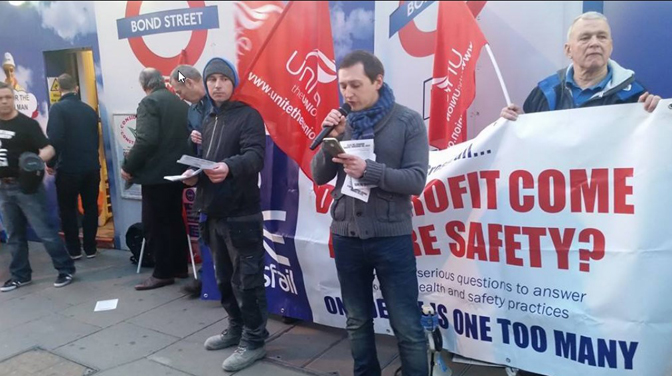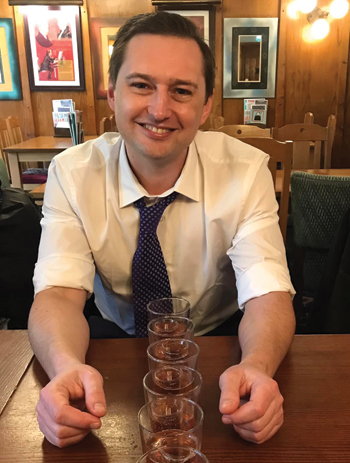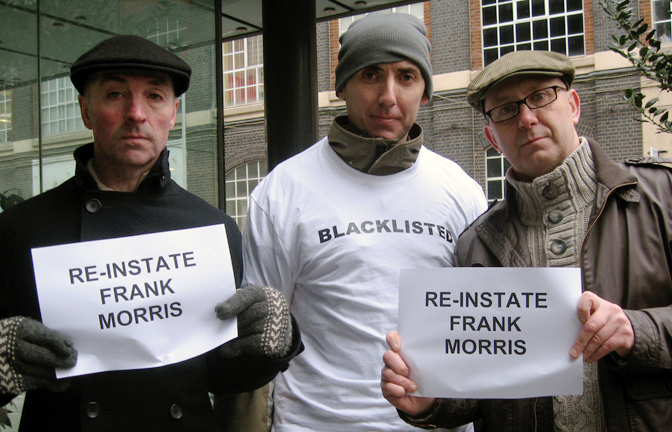
Unite member Daniel Collins was employed by the Costain/Skanska joint venture via an agency on the Bond Street Crossrail station project in February 2015, when he raised health and safety concerns.
Dan alerted his bosses to an unsafe “makeshift narrow walkway with no handrails”. He warned there was a substantial risk of workers, who would often be carrying heavy bags of concrete or other equipment across the walkway, falling from the platform and getting “seriously injured.”
UNCOVERED The first stage of the public inquiry into undercover policing reached its conclusion in February 2023 – and has found there was systematic spying on union activists because of their safety and other organising activities, and that this was linked to an employment blacklist. more
Three days later he was told to leave the project, despite being told earlier there was three years' worth of work at the site.
Unite instructed employment solicitors Thompsons to act on Dan’s behalf. The landmark legal case concluded on 20 March 2023, with Dan’s statement in open court spelling out in detail his evidence of blacklisting, breaches of data protection and misuse of private information against construction companies Crossrail, Costain, Skanska, T Clarke and NG Bailey.
In the statement at the Royal Courts of Justice in London, Dan revealed there was a “culture of hostility” towards trade union activists, which led to him being blacklisted from further work at Crossrail after sounding the alarm on a project that involved working at height.
After being fired in February 2015, Dan – who had in demand skills and since qualifying had “no significant difficulty” finding work – now found it “increasingly difficult” to find work in the sector and particularly on Crossrail. He was subsequently offered several jobs on the project, but then the offers would be withdrawn.
In March 2016, an employment agency offered Collins a job at Crossrail’s Paddington site, where Costain-Skanska was the main contractor and T Clarke was the subcontractor. But days later he got a phone call from the agency telling him the order for employment had been cancelled as the roles had been filled internally.
In June 2016, Collins was told by another employment agency that there was work at Crossrail’s Old Oak Common station project, where NG Bailey was the electrical contractor. Though he was sent induction forms and directions to the site, the employment agency told him four days later that the work was no longer available as the vacancies had been filled.
Collins said his difficulties in finding work led to mounting credit card debts and situations where he was unable to afford his household bills, meaning he had to be supported by his partner, his parents, Unite and trade union activist groups, including the Blacklist Support Group.
As a result of being unable to secure work, Dan was forced to leave the construction sector and seek employment elsewhere. Dan was convinced his inability to get work on Crossrail was due to the contractors and the client operating what he described in his statement as a “secretive system of misuse of private information” about union activists in a bid to stop them from getting work. So he set about his own investigation.

COURT OUT Unite activist Dan Collins celebrates on 20 March 2023 after delivering a damning criticism of Crossrail and its contractors at London’s Royal Courts of Justice. Eight years earlier he’d been fired shortly after raising safety concerns.
A series of subject access requests revealed how personal information about him had been widely circulated. This included an internal email from Costain that said: “We have a potential issue. Danny Collins is part of the Unite activist group”.
He also discovered that Costain, Skanska and T Clarke held private information on him concerning a grievance he had submitted to an employment agency, Premier People Recruitment (PPR), concerning an unrelated matter when he was working at Heathrow Airport.
Dan believes the details of the grievance had nothing to do with Costain, Skanska and T Clarke and there was no legitimate reason for them to have the information. The labour manager at T Clarke had forwarded the email correspondence about the grievance to his company’s group chief executive and group managing director and said: “Read and delete!!! I hope we never end up with this bloke on any of our sites.”
Although the companies involved denied liability, they agreed to pay damages and to pay Dan’s legal costs “for purely commercial reasons and without admission of liability or wrongdoing”.
Unite general secretary Sharon Graham commented: “This was a hugely significant case and demonstrates how Unite will back its members to the hilt. Unite is totally focused on defending the jobs, pay and conditions of its members and it will use all avenues available to defend their interests.”
Rachel Halliday, the solicitor from Thompsons who acted for Dan, said: “We were proud to represent Mr Collins and to secure him a settlement of his claim.”
Dave Smith of the Blacklist Support Group commented: “Imagine seeing an unsafe walkway at work and putting a note in the suggestion box. Any reasonable employer would fix the walkway. On Crossrail they sacked Dan Collins and paid £59k to a security firm to spy on union members.” Crossrail has exhibited a pattern of potentially illegal behaviour prior to Dan’s sacking, he said.
Crossrail managers had in 2010 retained a corporate security company, Control Risks. Its brief included monitoring of the trade unionists as part of work to protect the project from outside threats. Internal documents show how the security company compiled weekly reports on the trade unionists who were seeking justice for blacklisted workers – notably those supporting another trade union safety activist fired off the Crossrail job, Frank Morris, who was dismissed in September 2012.
 FRANK ADMISSION The sacking of Unite member Frank Morris (centre) from the Crossrail job in 2012 prompted a grassroots campaign, national media coverage and his reinstatement a year later. The company responded by employing a corporate surveillance firm to spy on the union activists who backed his campaign.
FRANK ADMISSION The sacking of Unite member Frank Morris (centre) from the Crossrail job in 2012 prompted a grassroots campaign, national media coverage and his reinstatement a year later. The company responded by employing a corporate surveillance firm to spy on the union activists who backed his campaign.
Control Risks tracked their campaign, analysing their tactics and the impact of their protests. It identified influential figures in the anti-blacklisting campaign and its potential future activity. The reports of the monitoring operation – codenamed Project Galahad – were sent to senior Crossrail executives. Control Risks was paid £47,857 in 2013 and £11,309 in 2010, according to Crossrail’s client, Transport for London (TfL).
The campaign by Unite and the Blacklist Support Group was subsequently successful, with Morris reinstated in September 2013.
Crossrail ended Costain and Skanska's role at Bond Street in June 2020, and instead took the job in-house. That saved the project more than £90m, Crossrail revealed last year.
But Unite said the involvement of Costain and Skanska in the case is significant. The two companies, alongside Strabag, have formed a joint venture company and are undertaking work on HS2 at Euston Station and elsewhere.
Unlike other joint venture companies working on HS2, the Skanska Costain Strabag joint venture has refused to agree an access agreement with Unite and won’t allow officials access to its welfare facilities to speak to workers, even though this is required by the client HS2.
Union power beats Scottish energy giant

A campaign of direct action has forced Scottish energy giant SSE to reinstate Unite branch secretary Greig McArthur and two of his colleagues.
The three were sacked by Kirby Group Engineering on 23 December 2022, leading to a protest outside SSE’s Glasgow headquarters. At the time they were on the verge of finalising a union recognition agreement.
In the wake of the dismissals, campaigners warned that labour shortages in the booming high voltage energy sector could lead to an erosion of safety standards without the protective effect of unions and on-the-ground union safety reps.
Inquiry confirms spying on unions and blacklisting
The first stage of the public inquiry into undercover policing reached its conclusion in February 2023 – and has found there was systematic spying on union activists because of their safety and other organising activities, and that this was linked to an employment blacklist.
Commenting on the findings of the ‘spycops’ inquiry led by judge Sir John Mitting, a statement from the union-backed Blacklist Support Group noted: “A few years ago, we were slated as conspiracy theorists for suggesting that undercover police infiltrated trade unions and blacklisted activists… the spycops public inquiry has acknowledged that it did happen.”
It added: “Counsel to the inquiry also accepts that intelligence was shared with employers to blacklist British citizens because of their perfectly lawful political and trade union activities. This is state sponsored blacklisting: plain and simple”.
Unite general secretary Sharon Graham said: “Finally it has been admitted what our members have always said. For decades not only were workers secretly spied upon by undercover police officers, for no good reason, but information was then frequently leaked to employers who used it to blacklist workers.
“Now the inquiry has finally accepted that blacklisting frequently occurred, no stone must be left unturned in discovering the true scale of blacklisting by the spy cops and reveal who in authority gave the green light for this. Equally there must be complete exposure of the infiltration of trade unions including answers as to why it happened and who considered it acceptable.
“This is the very minimum that workers and their families, who had the lives destroyed by blacklisting, deserve.”
LIVE WIRES
A blacklisted construction worker’s eight-year battle for justice has ended in victory, with a damning statement delivered to the Royal Courts of Justice. Electrician Daniel Collins received a substantial settlement, but his real win was exposing along the way how far some major firms will go to suppress union activity over safety..
| Related stories | |
| • | Union power beats Scottish energy giant |
| • | Inquiry confirms spying on unions and blacklisting |
| Hazards webpages | |
| • | Blacklist blog |
| • | Deadly business |
